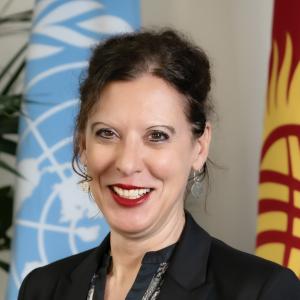Cholpon-Ata, 26 June 2025
Your Excellency, Deputy Chairman of the Cabinet of Ministers,
Distinguished Chairman and Members of the Central Commission for Elections and Referendums,
Dear participants,
It is an honor to join you in opening this Forum on electoral participation, on behalf of the United Nations.
The United Nations has been a longstanding partner of Kyrgyzstan on her democratic path. Over the years, we have supported successive electoral cycles, worked with the Central Election Commission to strengthen institutional capacities, and contributed to enhancing transparency and public trust in electoral processes.
As the country looks ahead to a new electoral cycle—culminating in presidential elections in early 2027, preceded by parliamentary elections—this Forum offers a timely opportunity to reflect, share experiences, and look ahead.
It is also timely as the UN system is currently finalizing a new electoral assistance project, requested by the Government, and developed by UNDP with contributions from other UN agencies including UNW and UNESCO under my overall leadership. This work builds on the United Nations Needs Assessment Mission conducted in September 2024 upon request from the Central Election Commission, which helped assess the electoral environment and identify priority areas for support, in close consultation with national stakeholders.
The NAM recommended that the United Nations provide technical assistance in the following five areas, which have a direct link with today’s discussion:
- Strengthening civic and voter education to enable informed decision making;
- Fostering inclusive and participatory electoral processes, through targeted outreach particularly for groups at risk of exclusion such as PwD, women, first time voters, religious groups and national minorities;
- Addressing disinformation, hate speech, and electoral risks, to safeguard trust and integrity;
- Enhancing coordination of international electoral assistance, to ensure coherence and complementarity; and
- Supporting the CEC’s collaboration with civil society, including NGOs and community-based actors.
We welcome the priorities identified together with the Central Election Commission for this new phase of cooperation. They go to the core of what makes electoral processes meaningful—not only in terms of procedures, but in ensuring that all citizens can participate and make their voices heard.
Promoting participation by women, young people, persons with disabilities, and ethnic minorities involves more than legal guarantees—it requires removing persistent barriers, expanding access to information, and ensuring that electoral processes are genuinely open to all. Strengthening civic and voter education, especially in rural and underserved areas, is crucial to ensuring that participation is both informed and inclusive.
Against this background, we commend the recent amendments to the electoral law, adopted by the Jogorku Kenesh and signed into law by President Japarov, which reflect the valuable contributions of the CEC. The strengthened provisions on gender representation—applying to both nominations and electoral outcomes—represent a meaningful step toward more inclusive political processes.
The NAM also emphasized the important role of civil society in supporting electoral integrity. Civil society organizations are trusted messengers and essential partners in civic education, outreach, and independent observation. Their involvement enhances transparency and public trust. For this to be effective, it is equally important that civil society can operate in an enabling environment that safeguards its independence and voice.
At the same time, elections today unfold in an increasingly complex information environment. Misinformation, disinformation, and inflammatory rhetoric pose serious risks to electoral processes and democratic discourse worldwide. In this context, the CEC’s continued investment in civic and digital education is both timely and commendable. Promoting media literacy and supporting quality journalism are also essential to ensure that voters have access to balanced, factual information.
As the UN Resident Coordinator—and in my role as coordinator of international electoral assistance in Kyrgyzstan—I reaffirm the United Nations’ strong commitment to working with national and international partners to support elections that are peaceful, inclusive, and reflective of the will of the people. We will do so in adherence to the UN’s impartial and non-political mandate, grounded in national priorities, international norms, and the principle of national ownership.
We look forward to continuing our close cooperation with the Central Election Commission, with the Government, with civil society, and with the people of Kyrgyzstan.
Thank you, and I wish you fruitful discussions at this Forum.


